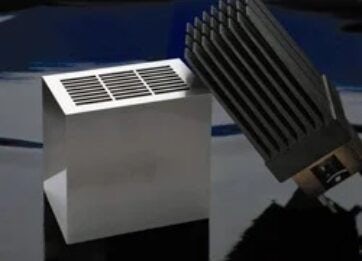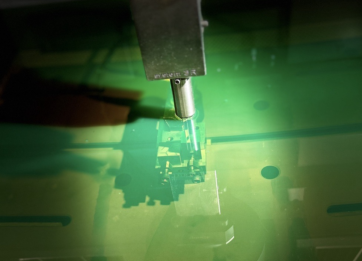In manufacturing, machining advanced materials is like solving a complex puzzle, and EDM (Electrical Discharge Machining) is a key piece in this puzzle. It’s a technology that’s not just about cutting and shaping; it's about precision and innovation, and it’s redefining the boundaries of what's possible.
In this article, you’ll discover:
- What exactly are advanced materials and why they are important
- How EDM technology expertly handles these tough-to-machine materials
- The critical role of precision in the successful use of EDM
What are advanced materials?
Advanced materials are at the forefront of industrial innovation, offering properties that standard materials can't match. First off, advanced materials aren't your typical metals or polymers. They include things like high-performance alloys, ceramics, and composites, each engineered for specific, often extreme, applications. Their defining traits? Exceptional strength, superior heat resistance, lightweight yet durable structures, and in some cases, unique electrical or chemical properties.
The very properties that define these materials as 'advanced'—like extreme hardness or high thermal resistance—can pose significant challenges in traditional machining. For example, machining a superalloy used in jet engines requires a method that can handle its high heat tolerance without compromising the material's integrity. Conventional tools may wear out quickly or fail to achieve the needed precision and integrity of the material. Similarly, ceramics' brittleness and composites' layered structures pose significant machining challenges, as they require methods that can cut without causing damage or material deformation.
Advanced materials are increasingly sought after in industries where performance under extreme conditions is essential. Aerospace, automotive, energy, and medical sectors, for example, rely on these materials for components that are routinely exposed to harsh environments, require exceptional longevity, or simply need to meet stringent safety standards.
The challenges in machining these advanced materials is precisely why industries are turning to specialised methods like EDM for their manufacturing needs.
EDM's role in machining advanced materials
When it comes to working with advanced materials, EDM plays a crucial role. Its unique capabilities make it an ideal solution for the challenges posed by these materials. For example:
Precision and versatility
EDM stands out for its exceptional precision, a critical factor for industries like aerospace and medical devices, where even the slightest deviation can compromise the integrity of a component. EDM achieves this high level of accuracy without direct contact, avoiding any potential material stress or deformation.
Handling tough materials
Advanced materials often have properties that make them resistant to traditional machining methods. EDM, however, uses electrical discharges to machine even the hardest materials like titanium alloys and hardened steel, as it can shape them without the physical strain that would typically wear out conventional cutting tools.
Complex geometries and fine details
EDM excels in producing complex shapes and intricate details, a common requirement in advanced material applications. Its ability to precisely control the machining process allows for the creation of geometries that would be challenging, if not impossible, to achieve with traditional machining.
Material integrity
Maintaining the integrity of advanced materials during machining is paramount. EDM ensures this integrity by providing a non-contact method of machining, which is especially important for materials that are sensitive to heat or prone to cracking under mechanical stress.
The importance of precision in EDM
Precision in EDM isn’t just about achieving the correct dimensions; it's about ensuring the highest quality, efficiency, and reliability in the machining of advanced materials. This precision impacts everything from the functionality to the reliability of the machined parts:
- Tolerances and component fit: Many advanced materials are used in applications where components must fit together with extreme accuracy. In aerospace, for instance, a minor deviation can have significant consequences. EDM offers the precision needed, often working within tolerances as tight as +/- 0.002 mm.
- Surface integrity: Advanced materials often function in environments where surface integrity is crucial, for example biomedical implants, where surface irregularities could lead to failure. EDM provides a high-quality surface finish, essential for components that face stress, heat, or corrosion.
- Minimising material waste: Working with expensive advanced materials means material efficiency is paramount. The precision of EDM ensures material is only removed where necessary, reducing waste.
- Repeatability for mass production: When producing large quantities of parts, consistency is key. EDM’s precision ensures each part is a replica of the last, essential for mass production scenarios in industries like automotive and electronics.
Advancements in EDM for better precision manufacturing
The world of EDM is continually evolving, with technological advancements pushing the boundaries of precision. These innovations are pivotal in machining advanced materials with even greater accuracy and efficiency:
- Advanced software integration: Sodick machines are equipped with advanced software solutions, like Q3vic, for efficient management of the EDM process. These software systems analyse workpiece geometry, optimise EDM parameters, and even facilitate CAD/CAM integration for streamlined operation.
- Smart EDM: The integration of automation and artificial intelligence in EDM technology has led to significant improvements in precision. Automated systems can adjust machining parameters in real-time for optimal accuracy, while AI algorithms predict and compensate for potential errors during the machining process.
- Improved electrode materials: The development of new electrode materials has also enhanced EDM's precision. These materials, which are more durable and conductive, allow for finer, more consistent machining over extended periods, crucial for complex and detailed work in advanced materials.
- Enhanced cooling and filtration systems: Modern EDM machines have improved cooling and filtration systems, essential for maintaining precision. These systems ensure stable machining conditions, preventing thermal distortion of the workpiece and maintaining the integrity of the surface finish.
Discover the precision edge with Sodick EU's EDM solutions
Now that you've seen the incredible precision and capabilities of EDM in machining advanced materials, the next step is clear. Unleash the full potential of your manufacturing projects with Sodick EU’s state-of-the-art EDM technology. Experience unmatched accuracy and efficiency in your operations.
Connect with Sodick EU today and elevate your manufacturing process to the next level of excellence.



